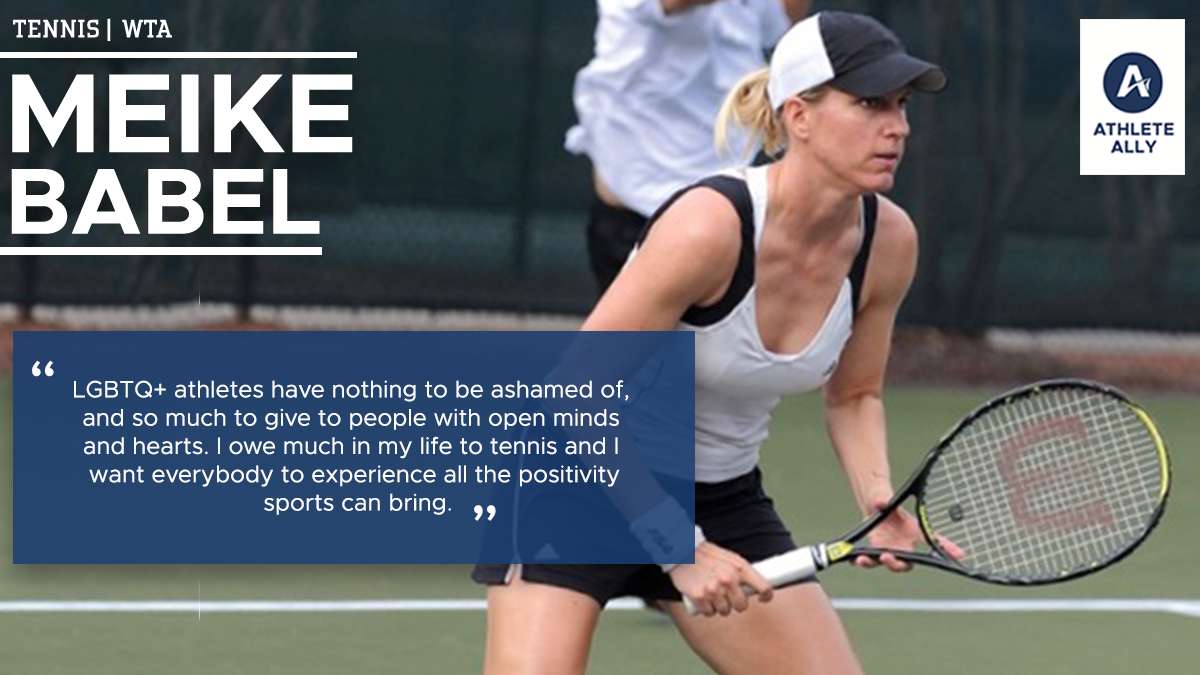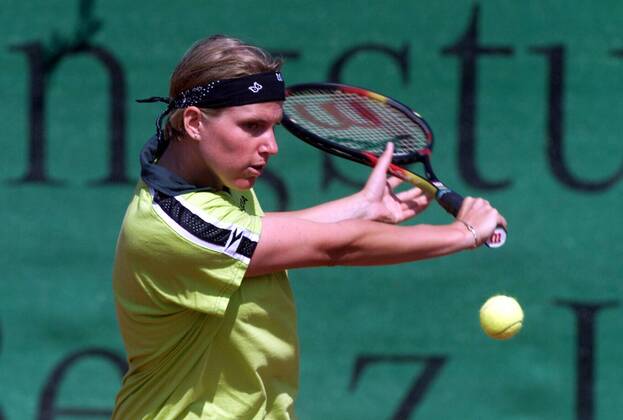Former WTA Player Meike Babel: I Won’t Hide Who I Am

By: Meike Babel, former Top 30 WTA pro tennis player, former women’s tennis assistant coach at Tulane and Vanderbilt Universities, and Athlete Ally Pro Ambassador
In retrospect, I probably should have figured out that I’m gay when I was 15 or 16 years old. I say “should” because, looking at it now, everything pointed to me being different from other girls, and taking it a step further, me being gay. I didn’t like wearing girly things or doing anything considered “appropriate” for girls, like playing dress up or putting on makeup.
In fact, the first time I had to wear a skirt on the tennis court, I felt like I might as well have walked out there naked. I had short hair, was mistaken for a boy lots of times, and genuinely had zero interest in boys other than them being my hitting partners. I had crushes on girls, only I didn’t interpret them properly as such.
I grew up learning that homosexuality was bad. I remember when Billie Jean King and Amelie Mauresmo came out, and the harassment they faced. It was also “normal” for coaches to make homophobic and misogynistic comments. A boy was called discriminatory words when he lost a set against a girl or didn’t hit hard enough. Coaches would discuss within earshot of us kids what they would like to do with certain girls and what they wouldn’t want to do with others because they were lesbians. Tennis Magazine printed an interview with our Fed Cup Coach who used homophobic slurs to describe women’s tennis. Nobody blinked, nobody was outraged, that kind of behavior was par for the course.
However, the most drastic lesson I received that being gay was “abnormal and deranged” was when I visited the Dachau concentration camp as part of my education as a German child. We had a guide, a survivor of this very camp, who told us her story. She told us that it wasn’t just Jews imprisoned in Dachau, but also Sinti, Roma, political inmates and homosexuals, anyone deemed “the other” by the Nazis. I remember seeing the pink triangle homosexuals had to wear. Our guide instilled in us that, “intolerance, hatred and violence are never far from the surface when someone feels threatened by those they don’t want to understand.”
It is up to us to stand up for the persecuted, no matter who they are. I have tried to live up to our guide’s words by refusing later to play for our national coach, which, of course, cost me nominations for prestigious events. I got disowned for calling out my stepfather on his racism. It has taken me longer to finally have the courage to no longer care if I lose clients or don’t get jobs because I’m gay.

IMAGO/ALFRED HARDER
It took me until I was 32 and after my professional tennis career to figure out my sexuality. I don’t feel ashamed or guilty at all for who I am, but internalized homophobia didn’t allow my brain to put 2 and 2 together sooner. I just always fell short in interpreting correctly what I was feeling. Once I got involved with a woman, everything clicked into place. To me, it was an incredible relief actually because so many things in my life now finally made sense! However, with it also came sadness and anger about the lost time in which I felt not whole and out of place. That’s still something that I have to work through almost every day.
It has also taken me longer to take up a more public space to fight for LGBTQ+ rights, because like so many in our community, I experienced physical and verbal attacks for being gay. However, the fear of those attacks is outweighed by knowing that I can show kids that it’s perfectly normal to be in love with a woman, that it is perfectly normal to identify outside of the gender binary, and that I’m a safe person to ask questions to. I am no longer willing to hide who I am. If someone doesn’t want to be coached by me, it’s their loss.
I’m proud to become an Athlete Ally Ambassador. I’m hoping that by just being myself, people will see that it’s absolutely an option to be LGBTQ+ and be successful in both life and sports. We have nothing to be ashamed of and so much to give to people with open minds and hearts. I’m also grateful and excited to receive more tools with which to work with our governing bodies to make tennis more inclusive for all LGTBQ+ people. I owe much in my life to tennis, and I want everybody to experience all the positive things sports offer.
Want to receive stories like this in your inbox? Sign up here.